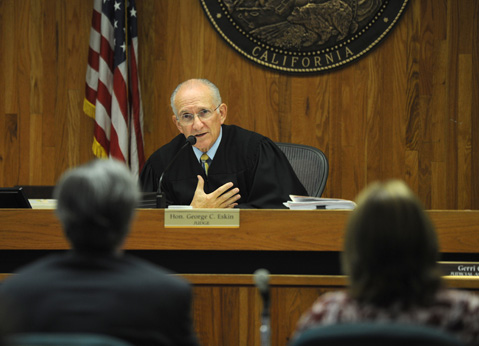A Question of Justice
Parking Ticket Embezzler Karen Flores Goes from 'Princess Prison' to Early Release

Karen Flores doesn’t look like she stole $700,000 from the police. She looks like somebody’s mom.
But in 2013 she admitted that she had been busily embezzling thousands of dollars in parking ticket fines from the Santa Barbara Police Department, where she worked as the business office supervisor. In a letter to Judge George Eskin, she pleaded for mercy, describing her personal travails — she was overworked and underpaid, she was fighting a battle with depression, and most importantly her young son needed his mother. Her attorney touted her clean record. “She never even had a parking ticket!” he exclaimed without an ounce of irony.
Judge Eskin, however, sentenced Flores to 10 years in state prison. From the bench he reminded her that because of her seven years of thieving, civil servants lost their jobs and public services had to be cut. The SBPD was humiliated by a blatant theft happening right under its nose by someone it trusted. Justice dictated, Eskin declared, that the sentence reflect the seriousness of her actions.
Last June, to everyone’s great surprise, Flores was seen wheeling a shopping cart down the aisle of a Santa Ynez grocery store — less than two years after she was led away in handcuffs. How could this have happened? Judge Eskin, Deputy District Attorney Brian Cota, and just about every police officer in the city were stunned. But it was true. Flores is back home in Santa Ynez, with a 6 a.m.-10 p.m. curfew, wearing an ankle monitor for the next year, and forbidden to travel more than 50 miles from her house without permission.
“I was definitely surprised,” said Eskin. Everyone knew Flores would likely serve only half of her 10-year term because of custody guidelines for nonviolent offenses, but nobody had any idea she’d be home so soon. They wondered about the message the state prison system was sending by lightening a stiff penalty so dramatically.
“At what point does a sentence become not a deterrent but an incentive?” Cota asked. “And I think the victims in this case — the Police Department, the city, the people — might not feel justice has been served.” Cota said the case raises all sorts of questions about how our prison and court systems treat white-collar criminals, and whether punishment is being fairly meted out in an ever-shifting landscape of new sentencing laws and congested jails.
Flores sees her situation differently — very differently. She thinks her sentence was unfairly harsh. She believes Santa Barbara law enforcement threw the book at her because she betrayed them, that her “ridiculous” 10-year term was a reflection of their single-minded quest for vengeance. Flores disputes the amount of money she stole, how lavishly she lived with the ill-begotten funds, and what price she should have to pay for her crimes. And now she wants to set the record straight, to undo the police and media smear campaign that she says painted her as a callous monster, gobbling up public money. “I am just a person,” she said. “I am not a mastermind criminal. I am a woman, a mother, a grandmother, daughter. I could be anyone you know.”

Karen Flores arranged to meet me in her therapist’s La Arcada office last December. A short, middle-aged woman with a trim blond bob, Flores smiled nervously, clutching a tissue, and was flanked by her husband, Steve Flores, and therapist, Patricia San Filippo. For a long time after her arrest, she said, her motivations were a mystery even to her. “It makes sense to me now,” she told me — so we started at the beginning.
Flores, now 51, was adopted at birth in Santa Barbara by a Scottish immigrant couple. Her childhood was a happy one, with loving parents who prized hard work and self-sufficiency above all. When she became pregnant at age 16, it broke her father’s heart, but he soon came around. Flores earned her GED and got a part-time job. She had two more children with her first husband, but they later divorced. He wound up addicted to drugs, got fired from his job with the city, never paid child support, and had to spend time in prison.
In 1988, when Flores was 25, the Santa Barbara Police Department hired her as a data entry clerk in the parking citation office. That made her dad, also a city employee, very proud. She quickly moved up the ranks and within seven years was promoted to lead supervisor. She was appointed to department committees and formed close friendships with colleagues. Flores was pleased to become the go-to person in the office. “It was always, ‘Give it to Karen; she can handle it,’” Flores remembered.
In 2001 Karen met Steve Flores, who worked construction full-time and bartended at night. They rented a house in Buellton, married a few years later, and had a son. Life was good. But behind the happy façade, expenses were adding up, and Flores was struggling to make ends meet. Steve, who turned over all family finances to his wife, was oblivious to the building tensions. Flores remains bitter that a large raise she was promised never materialized. This was at a time when the city began mandatory work furloughs, and employee health-care costs rose. Then, the Great Recession hit, and Steve found himself out of work. “The pancake flipped,” she said. “It was just one thing after another.”
But Flores, who was making around $100,000 a year in salary and benefits, couldn’t admit their money woes to her husband or anyone else. She attributed her silence to her stern Scottish upbringing, which led her to believe that if she asked for help, she would be seen as a failure and lose her family’s respect. That irrational fear, she discovered through therapy, had roots in her adoption. “I realized my abandonment issues were all from somebody not wanting me when I was a tiny baby,” she said. “It made me want to take care of everything and make everybody happy so they wouldn’t be disappointed in me.”
So she started stealing. She doesn’t remember the first time. “I’ve been asked that question over and over,” Flores said, shaking her head. But she does remember believing she would one day return the cash. “I would think, ‘I just need this right now. I’ll pay it back later,’” she said. “I don’t know at what point it snowballed, but it became an addiction,” she explained. “I had to do it to feel safe.”
What did Flores spend the money on? According to bank records in her case file, she bought a boat, two cars, two ATVs, and jet skis in one 15-month period, also purchasing golf clubs, wakeboards, and a foosball table over the seven-year period. Her colleagues had told investigators Flores often took them to lunch and would hand out envelopes full of money on birthdays and other special occasions. But according to Flores, she only spent the money on “life. It was to pay the bills,” she said. “To keep things going.” She also claimed in our interview that she only stole $250,000-$280,000, not upward of $700,000.

Because Flores knew the parking citation system inside and out — which had little to no oversight other than her own supervision — she was easily able to cover her tracks. According to court records, she had different methods of thieving. Mostly, she would alter deposit slips that were filled out in pencil. She would also keep double or overpayments; delete tickets in the computer system, keeping the money; and not enter handwritten tickets into the system, pocketing the cash when they came in and then shredding the tickets. Her bank records showed she regularly made large cash deposits.
Finally city accounting staff began to notice that the city ledger did not match the recorded parking revenue. Santa Barbara, which regularly collects approximately $4.5 million in citations annually, was now $100,000 short. An investigation began. Flores, who held a key role in the investigation, was able to lay red herrings along the way — citing outdated software, delaying new safeguards, and so on. But eventually suspicion firmly pointed to Flores. Late at night the department’s deputy chief would spend hours in her office fishing out the shredded tickets from her trash and puzzling them back together to establish evidence.
Flores felt the vise tightening. Still, she couldn’t stop stealing. She thought about turning herself in but wasn’t able to muster the courage. “I’m not good at standing up for myself,” she said. According to her therapist, this reflects how her mind works, “her sense of self-worth, and how she got in this situation.”
The DA’s Office argued that Flores was evasive and uncooperative through most of her interrogations, but she disagrees, saying she told them everything immediately. Even the prosecutors admit that it wasn’t an open-and-shut case. The evidence was incriminating but circumstantial. Her eventual confession proved key to the authorities. “The way I was raised, you do the right thing, and you respect law enforcement,” she said.
Flores said she began her journey of self-discovery and redemption as soon as police came to her house in the middle of the night. Her therapist, whom she had been seeing for the two years between her arrest in 2011 and her sentencing in 2013, told her to use the time behind bars to look inward and confront what made her self-destruct. Her prison counselors advised: “There’s something broken inside you that needs to be fixed. And until you fix little Karen, big Karen is going to keep screwing up.” She found religion, too. “They say God is in prison,” Flores mused. “He really is.”
Her first stops after Santa Barbara County Jail were the Central California Women’s Facility in Chowchilla and then the California Institution for Women in Corona. Flores described both places as “living hell.” She witnessed beatings, overdoses, and inmates giving guards sexual favors in exchange for privileges. Flores mostly kept to herself but made a few friends who promised to protect her. It was clear she didn’t belong in prison, they said.
Steve regularly visited with their young son. As the months dragged by, Steve found himself ever more incredulous of his wife’s long sentence. He encountered inmates who had committed far worse crimes and received far less time. “Sure, she stole money,” Steve said. “But people do that every day. Every day. And in way bigger quantities. So what makes her so special?”
Flores took advantage of every in-prison program she could, hoping to shave time off her sentence. “Everything I did was to get back home to my family,” she said. Before long, and without requesting it, she was transferred to the Female Rehabilitative Community Correction Center in Bakersfield, a 75-bed facility, known in the trade as a “princess prison” where “it’s easy to forget you’re in prison,” said Flores. Inmates wore regular clothes, had bingo nights, participated in many group therapy sessions, and were addressed by their first name. Flores was the outlier — all the other women were alcoholics or drug addicts with little education, few job skills, and no outside support. “People would look at me and be like, ‘Why are you here?’” Flores remembered.
Eventually Flores applied and was accepted into the state’s electronic monitoring program. But just because she’s home doesn’t mean she got away with anything, Flores declared. She’s branded a felon for the rest of her life. “I lost my retirement, I lost my inheritance, and I can never get a job to support myself,” she said. “That’s scary — to be a woman and be completely dependent.” Right now she’s helping Steve with his construction company’s bookkeeping and is an office clerk for an organic farm.
Flores said she’ll be paying restitution for the rest of her life — just under $700,000 to the city and $112,000 to the Franchise Tax Board. She doesn’t think she’ll ever come close to making the full amount.

Judge Eskin was not sympathetic to her complaints. “That saddens me,” he said. “That suggests to me she hasn’t accepted responsibility.” It was an appropriate sentence he maintained, and her continued grousing shows a serious flaw of character. Of Flores’s contention that he sentenced her unfairly, Eskin said simply: “Bull.”
Handing out prison time is an imperfect science, explained the now-retired Eskin. A judge must consider the hard facts, the overarching purpose of penal sanctions — to strengthen the rule of law, to deter crime, and to punish — as well as the public expectation of justice. “It’s usually a no-win situation,” Eskin said. “If we were controlled by victim expectations, no one would ever get out.”
Eskin, like Cota, doesn’t fault Flores for taking advantage of programs to reduce her time. Who wouldn’t? They’re both proponents of reentry initiatives to decrease recidivism and improve the chances of offenders succeeding when back out in society. And they both favor sentence reform that emphasizes actual rehabilitation over the blind hammer of lengthy prison terms. What leaves them dumbfounded is Flores’s sentence morphing so radically beyond their original intentions.
Cota is the district attorney’s go-to guy for white-collar crimes. He’s prosecuted everything from multimillion-dollar Ponzi schemes to small-time cash-register skims. Flores was the first high-profile defendant he’d seen released so early, and it made him wonder who else is getting out and when. When Flores was released on electronic monitoring, state prison officials never consulted with Santa Barbara law enforcement. That’s standard procedure. Cota thought it might be a good idea to let local judges, attorneys, or probation departments weigh in on such deliberations. “Who’s more familiar with the case?” he asked.
Cota was sympathetic to prison officials’ dilemma. They’re grappling with an overcrowding crisis so bad it spawned emergency legislation, forcing the entire California criminal justice system to rethink how it locks up people. But Cota believes it’s clear that the public wants white-collar crimes punished more harshly than other nonviolent crimes. He pointed to new sentencing laws that mandate prison time for certain white-collar offenses, as well as escalating enhancement terms based on the amount of money stolen.
And white-collar criminals are a specific breed of offender, who tend to be older, educated, respected members of a community — people who’ve worked their way into positions of trust. More often than not, greed and a skewed moral compass motivate their crimes. Are these the kinds of prisoners who should be sent to valuable but limited reentry programs, who should take a bed that might otherwise be occupied by a person in real need of drug counseling or job-skills training? “It’s hard for me to imagine that there wasn’t somebody in the prison system who would benefit more than Flores from being there,” Cota said. “I hope she did learn something. I would hate to think it was a waste.”
Krissi Khokhobashvili, a spokesperson for the California Department of Corrections, admitted Flores may not seem like a typical candidate for one of the reentry homes. “But what someone presents on the outside could be completely opposite from what is going on inside or what they really need,” she said. “Every woman is different.” Khokhobashvili said multiple committees and counselors reviewed Flores’s case, and that anytime the department decides to place an inmate in a transitional facility or on electronic monitoring, “We take that really seriously.” She also disputes any interpretation that Flores got off easy. “She’s still coming out with a felony conviction and a prison term.”
Flores considered moving out of Santa Barbara County when her probation ends. But she finds hope and comfort in her church and her family, and realized running away wouldn’t solve anything. Her greatest regret is disgracing her family. It’s impossible to avoid stares and whispers. But no matter what society and the justice system throw at her, Flores said, “Nobody will ever punish me as much as I have punished myself.”



